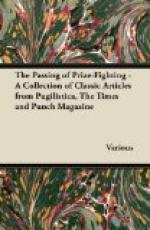“BONDUCA went early,” she said, adding, with a weak irrelevance. “She mid ‘a’ had her pick to-day. A mampus o’ men have bin after her—fourteen of ’em, all the best lads round about, some of ’em wi’ bags and bags of gold to their names, and all wanting BONDUCA to be their lawful wedded wife.”
ABRAHAM shifted again. A cunning smile played about the hard lines of his face. “POLLY,” he said, bringing his closed fist down upon his knee with a sudden violence, “you pick the richest, and let him carry BONDUCA to the pa’son. Good looks wear badly, and good characters be of no account; but the gold’s the thing for us. Why,” he continued, meditatively, “the old house could be new thatched, and you and me live like Lords and Ladies, away from the mulch o’ the barton, all in silks and satins, wi’ golden crowns to our heads, and silver buckles to our feet.”
POLLY nodded eagerly. She was a Wessex woman born, and thoroughly understood the pure and unsophisticated nature of the Wessex peasant.
CHAPTER III.
Meanwhile BONDUCA PEEP—little BO PEEP was the name by which the country-folk all knew her—sat dreaming upon the hill-side, looking out with a premature woman’s eyes upon the rich valley that stretched away to the horizon. The rest of the landscape was made up of agricultural scenes and incidents which the slightest knowledge of Wessex novels can fill in amply. There were rows of swedes, legions of dairymen, maidens to milk the lowing cows that grazed soberly upon the rich pasture, farmers speaking rough words of an uncouth dialect, and gentlefolk careless of a milkmaid’s honour. But nowhere, as far as the eye could reach, was there a sign of the sheep that Bo had that morning set forth to tend for her parents. Bo had a flexuous and finely-drawn figure not unreminiscent of many a vanished knight and dame, her remote progenitors, whose dust now mouldered in many churchyards. There was about her an amplitude of curve which, joined to a certain luxuriance of moulding, betrayed her sex even to a careless observer. And when she spoke, it was often with a fetishistic utterance in a monotheistic falsetto which almost had the effect of startling her relations into temporary propriety.
CHAPTER IV.
Thus she sat for some time in the suspended attitude of an amiable tiger-cat at pause on the edge of a spring. A rustle behind her caused her to turn her head, and she saw a strange procession advancing over the parched fields where—[Two pages of field-scenery omitted.—ED.] One by one they toiled along, a far-stretching line of women sharply defined against the sky. All were young, and most of them haughty and full of feminine waywardness. Here and there a coronet sparkled on some noble brow where predestined suffering had set its stamp. But what most distinguished these remarkable processionists




